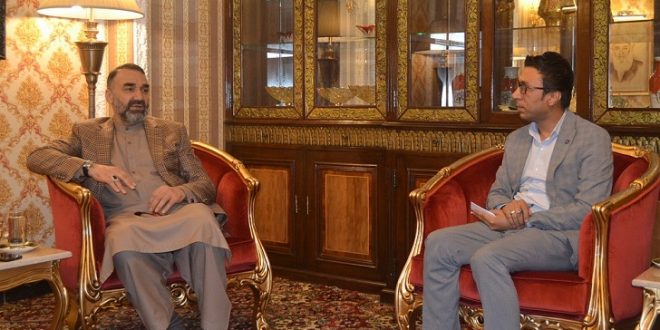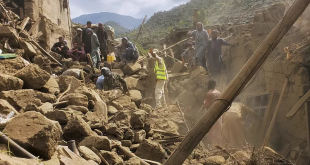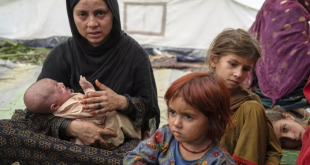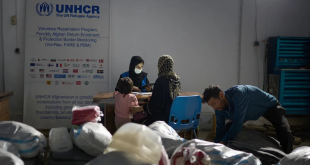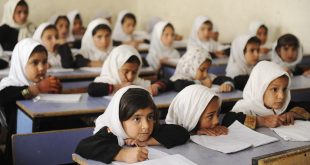Afghanistan has been in a whirl of unending war and unfettered turmoil for over four decades now. Peace or state of normalcy is still a distant dream, where militant groups intensified violent acts, and the recent US-Taliban peace talks – the only hope to get Afghanistan out of current war, has been collapsed. Insecurity has been increased with taking more lives from Afghan security forces and the civilians. Deadly bombings and suicide attacks occurred around the country, including Kabul, the capital city that exhibited security leaderships failure in maintaining security. President Elections is scheduled for 28th September. The credibility of election is already under question due to threat of fraud which was frequent in latest parliamentary and in 2014 presidential elections that nothing was left for another civil war. The than US administration intervened as a result National Unity Government (NUG) formed. To explore these questions, we have interviewed prominent political figure, Atta Mohammad Noor. He has been critical of the government’s policies, believing that resumption of peace talks is the ultimate way to restore peace.
How do you evaluate the Government of National Unity?
In the name of Allah …!
I think there have been a lot of discussions in this regard and I have had a lot of positions. NUG has been based on compromise since its inception. Firstly, it was struggling with its legitimacy. Secondly, it was established as part of an agreement and coordination to come out of the crisis – an extra-legal government based on national compromise and interests. If we honestly evaluate its performance and activities, there is no achievement, a change in people’s lives, effective security improvement, or employment programs that deserves praise. There is nothing – in fact we didn’t see anything. The projects that they were inaugurating two or three times … they were from former President Hamid Karzai’s era and were ready to be exploited. We didn’t see any such programs that they promised regarding bringing change in people’s economic situation, changing the lives of the teachers and providing them with homes, or youth employment so they could do some good work other than being killed.
You see, they didn’t just fail to create job opportunities but caused already existing two million employment opportunities to vanish. Investment and business activities were restricted, personalized, and many traders were blacklisted, but some based on their relationships unlawfully received good treatment. Other businesses, which had hundreds and thousands of employees and earned prosperous livelihoods, directly and indirectly, were blocked. What I mean is that work opportunities just came to a halt. For this reason and distrust, capital and capitalists fled out of the country. The youth intellectuals unfortunately escaped. The currency exchange rate, which used to range from 56-57 Afs, went up to 81 Afs against one dollar. According to findings, the unemployment rate reached 60 percent and about 65 percent of the population lives below the poverty line. This situation is really overwhelming. The facts are not revealed; on average 150 to 350 coffins enter people’s homes on a daily basis. It also shows that this much people being victimized is just outrageous. The level of drafting into the armed forces has fallen due to poor management and increased casualties. The Armed Forces are a symbol of the dignity, integrity, honor and national pride of a land, but they are fleeing due to poor combat management and increased casualties.
This has led people to lose confidence in management of the war and deciding not to send their youngsters to the armed forces because people see that the conflict is not well managed. The troops get besieged but are not reinforced, and rescuers don’t arrive on time and fast enough to help them. On the other hand, the capacity for warfare is weak. People do not trust the government and do not send their children to serve the system. We will be in a bad situation tomorrow, God forbid, in terms of the armed forces because the casualties are high, the military personnel escape and the level of absorption is low. Meanwhile, poverty is also at its peak. If we were to point to the achievements of NUG in any sphere, there is none. Ethnic discrimination is unfortunately one of the major problems that weaken the government. We have not seen this much ethnic dissension under any circumstances that it is today. For clarity, one important point that I would like to refer to is that both President Ashraf Ghani and CEO Abdullah Abdullah cannot justify themselves. They both have a 50-50 share in their underperformance. Any shortage in this country and any problem that people face – if it is poverty or … – are caused by these two rulers. They both are guilty in not going ahead with a good understanding and agreement. They are both blameful for not having a program. If they couldn’t defend the people, they deserve to be blamed. If the war was not managed properly, they both should be blamed. We have witnessed that much of the geography has been lost and now the Taliban are in its control and unfortunately the government-controlled geography is being confined to cities only with each passing day.
Overall, the five-year rule of the government has been the way I described it.
Although rebuilding an old building is a good practice but we can’t say that everything will be solved by rebuilding it. Off the top of my head, the sites that were registered with UNESCO were unfortunately repaired by the government without the usual UNESCO-approved method. The restoration of the monuments should be according to their own specific era and had to be restored to their original form and style but they were repaired in ordinary and today’s style – leading to their removal from the UNESCO registration. This is also a huge damage to our historical relics and they were restored merely for campaign purposes.
Why did the peace process fail?
The peace process is a national program and peace is one of the primary needs of the people. We have always said that our whole struggle is for peace and achieving it is a priority for us; because unless peace is implemented, killing, bleeding, bringing the victims’ flesh and pieces to homes, and bringing caskets to homes wouldn’t reduce. The failure of the process is due to the lack of a general consensus in the country. Although there has been enough political consensus outside the country, except one or two countries, but:
- There hasn’t been a proper domestic political consensus;
- The government didn’t have a program to satisfy the international community and the Afghan people and political figures, which means that the government was anti-peace and even created challenges in the way of peace. All this was done just for the sake of achieving control of the peace by the government. We had the same viewpoint as the government, but we also wanted the participation of national political figures, political parties, civil society and women in the peace process along with the international community. The Taliban were also keen to negotiate with those they fought yesterday (powerful political parties and national political figures) who constitute the main side in the negotiations. The Taliban did not want to sit with the government because they did not recognize it as an official government, but our decision was for the government to be also present, as well as incorporate the Taliban’s stance. The Taliban accepted government presence only alongside political figures. The government did not have a unified plan for peace that was consensus-based. The government steered the process towards failure and created hurdles for it and ultimately it was destroyed with President Trump’s tweet. I think the Taliban crossed the line too. Their extremist behavior was unbearable for the Afghans, as well as for the US and the international community.
I hope this process is relaunched and the circumstances also suggest that this process will resume. Talks are said to be still ongoing behind the scenes but we expect the peace process – with the support of the international community, neighboring and regional countries – be turned into an absolutely intra-Afghan one. We are going to meet at former president Mr. Hamid Karzai’s house these days and we want to bring about a coalition under a large umbrella on country level whereby the majority of political figures, national figures, political parties and people of different ethnicities would participate. This consensus will be established to work for peace and manage any situation in case the country goes into crisis and the outcome of the election is not good.
Can election hinder peace?
Certainly, I believe that the election is a national process and we support it, but the situation is not conducive and ready for it yet. Holding election in the current situation will be fraudulent and will lead the country to a crisis that will fuel and expand the war into every home and will be turned into an ethnic war. Taliban negotiators, on the other hand, see themselves as out of government and power for the past five years, something that force them to multiply the war and make it more animus with nothing else but continuous bloodshed. Therefore, for this election to be effective – although I said it is a national process and we support it and should be held – it doesn’t not have to be held on the scheduled date. Our demand is that peace has to be first and under the umbrella of peace by the formation of a transitional or interim government – with the help of the international community and national consensus – a ceasefire be achieved. This would facilitate negotiations for both parties (Taliban, government and influential figures) and pave ground for transparent election by introducing reforms in the Independent Election Commission (IEC) and the electoral system. In that situation, the result will be acceptable and there will be no crisis. Otherwise, this election will be nothing but fraud, and the crisis is inevitable which in turn damages the peace.
What is your assessment regarding the Taliban?
In Moscow, we negotiated twice with the Taliban independently and a few with their leaders in other places. Their mindset had sufficiently changed from the past and their level of political awakening had also been slightly better. For this reason, they have been able to establish relationships with countries and introduce themselves to the world. The Taliban have a false sense of pride, which is that they think they can conquer Afghanistan and then give some share in power to others. This is my understanding of them and they did not say it directly. This perception of them was wrong and if you have heard, we clearly told them in Moscow that they shouldn’t believe they have defeated America and could enter and conquer Kabul. This is the notion that gives rise to more war and we both know this because we have fought together for years. In the past you had captured 95 percent of Afghanistan but failed to destroy us. Meanwhile, 150,000 NATO troops weren’t able to destroy you. Therefore, if you think you can win through war, it is impossible. We are the reason for foreign troops’ presence and if we do not fight, the ground is automatically and strongly paved for their withdrawal.
How do you assess the role of Pakistan and Iran in the peace process?
These two countries play a significant role compared to many other countries. Pakistan is the birthplace of the Taliban and can still play a major role. I told Pakistan’s Imran Khan and the Pakistani Foreign Minister that “you can pave way and be more effective in facilitating peace in Afghanistan than other countries.” It is clear that Pakistan can play this role, as it has nearly 2,500 kilometer-long crossing points with Afghanistan and most of the Taliban have their homes in Pakistan and their wounded fighters are treated there.
Iran is also one of the important countries in our neighborhood and it has very extensive and deep relations with the Taliban right now. The Taliban travel to Iran and even have offices there.
Perhaps Iran’s view is that why it is excluded from the peace process? What does the US want from Afghanistan and where does Iran’s interests fit in it?
In order to secure its interests, the country continues creating challenges until their interests in the region are addressed. Other than Pakistan and Iran, the neighboring and regional countries, such as China and Russia, can also be effective in the peace process.
President Ghani had said that no one could impose another Treaty of Gandamak on him. What does this remark mean?
The disgraceful Treaty of Gandamak is past and we are now in the age of awakening the nations. Indeed, no one is going to sign a peace deal blindly and our motto was that we want dignified and lasting peace that does not compromise our 18-year achievements and national interests.
The Islamic Republic in Afghanistan’s name in compliance with the Constitution is a proud achievement for the Afghan people which should not be changed. This stance of ours was very clear and the President could also argue and come into the scene more accurately after giving others time for deep discussions. This practice would have cleared up all the behind-the-scenes stuff and would have also put people in the picture.
What do you think about Afghanistan’s security sector?
There is no doubt that the Afghan security forces are the children of this nation. They work hard but they are sacrificed. In my opinion, the problem is in the management. Security programs and military doctrines have issues. We are in a defensive situation 80 percent of the time; therefore, defensive condition causes more damage in the war (whether it’s conventional or non-conventional). The defensive mode erodes the war and weakens capabilities whereas the offensive spirit raises forces’ morale and thus they don’t get tired. In this case, the forces do not face wars of erosion. Erosion wars are boring, and as a matter of fact they breakdown regular strengths. The problems are in the military doctrine and in the programs, capabilities and strategy of the system but the Afghan National Security and Defense Forces are really performing a feat, something that we hold in high regard.
Election will be held in a few days; what will be the outcome of the forthcoming polls?
It seems to be the case that since the peace process has stalled, the election is going to be held. The international friends and partners of Afghanistan are also interested in the election and it is thought that the Taliban should not imagine that they could halt a national process. The fact is that they are emphasizing in one way or another and wanting to say that there was election in Afghanistan – to show its donors – but they do not have a clear vision and it is not fair and honest, so the result is going to be a crisis and deep and very dangerous conflicts.
Will the crisis happen with the victory of any candidate or only with the victory of President Ghani?
It doesn’t matter, any faction that wins will lead to crisis because the two prominent teams which are in the running have relatively become ethnic. The crisis will deepen so much that the international community and international forces will have to intervene; otherwise, the Afghans will not be able to prevent it.
What will happen if a government like NUG is set up again?
I hope a government headed by two isn’t established. And if the election were transparent and one side won and it was realized that there was no widespread fraud – which is most unlikely – it is better that the other party accepts and congratulates the winner. Otherwise, if it comes to the intervention of the international community, a government with the participation of all parties, ethnicities, political parties and candidates would be better than one which is shared by two leading tickets.
It is said that the foreigners deliberately want to turn the election results into a crisis and are seeking to open the door for the Taliban’s participation. What’s your take on this?
Foreigners realize that election will not be transparent and will be rigged. The result of fraud is obviously controversies and crises; therefore, it is heard that fake election can be a reason for a coalition or joint government.
You were a supporter of the Atmar’s team; why it collapse
We had the strongest team with Haneef Atmar and we had plans and we were going with the plan. The program – restructuring the administrative structure of the system and other matters – was based on people’s wishes.
Mr. Atmar had agreed but some figures close to him within the team – I don’t know where they took their mission or orders from? – tried to provoke distrust between us and I backed down based on my people’s demands – even at the cost of breaking up the team – because we didn’t want a position or throne. We wanted a change in the administrative structure of the system in a fair and modern way. When this change of ours couldn’t be materialized, I backed down from my claim, and our social and political power was as much influential that after I left, a strong team disbanded. Atmar was a bit of faint-hearted, too, and used to worry because he had no money. Rigging was also a concern for him, and the idea that peace is coming had engaged his mind. Atmar thought that although we worked hard, it wouldn’t work out. But the reason for the team’s disintegration was me leaving it.
There are some rumors that Atmar will support Ghani? What do you think?
I don’t think it suits Atmar.
Which team do you support?
We do not support any team and we want to stay in the opposition and continue to be with a national team that can manage all of Afghanistan’s affairs to make things better for the people.
What is your role in managing the crisis that you think will come after the election?
I will do anything that complies and serves our national interests. Our message is that if the government is able to hold a transparent election then it is good but if it cannot, it should focus more on peace. I also call on the people, national and political figures and parties of the country to establish a big umbrella on Afghanistan level so that we can end up effective in securing peace and preventing the crisis; In Sha Allah, I will also stand alongside them.
 Afghanistan Times
Afghanistan Times
